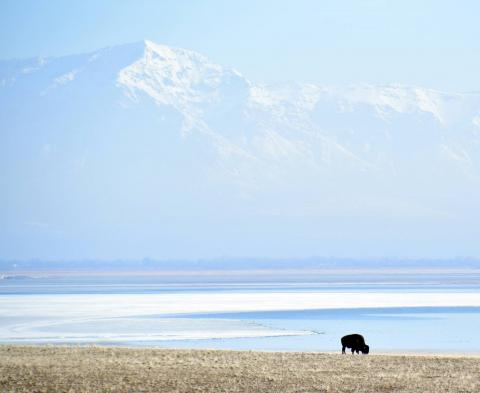
BLM Violates Own Wild Horse Welfare Standards
Roundup Incident Sparks Outcry
COLORADO SPRINGS, CO – (Feb. 28,2017) On February 12, the Bureau of Land Management (BLM) conducted a helicopter roundup of wild horses at Cedar Mountain Herd Management Area (HMA) in Utah. The Cloud Foundation (TCF) and advocates across the country contend that BLM’s actions at the roundup violate standards in their own Comprehensive Animal Welfare Program (CAWP).
Eyewitness, Mosie Trewhitt, a professional horse trainer, photographed the incident of a lone pinto mare being driven by a helicopter. The mare could not keep up with her band but the helicopter kept pushing her. Then a wrangler joined the pursuit and both helicopter and wrangler chased the mare on a dead run along a barbed wire fence line. The wrangler tried to rope her numerous times and was finally successful. The mare lurched and flipped over or tried to jump the fence. She became entangled in the barbed wire, and ended up on the other side of the fence.
The mare escaped, dragging the rope behind her and has not been seen since the incident according to BLM who also contend she was uninjured. Trewhitt’s blog, Voices of the Herd, documents the incident with vivid photographs. Fears persist that this mare who appears to be pregnant may be strangled by the rope or suffer from infection due to an obvious gash on her right rear leg.
“I’ve witnessed roundups since 1994 in which inhumane actions were common and often ignored,” states Ginger Kathrens, the Executive Director of the Cloud Foundation and the BLM’s Humane Advocate on the National Wild Horse and Bureau Advisory Board. “To their credit BLM responded to growing concerns about the inhumane treatment of wild horses and burros during and after roundups by creating the CAWP.”
In 2011 BLM began the process of creating humane roundup standards. The final product, published in 2015, tried to reduce incidents like this. “Years were spent on this document at considerable expense, but the document does no good if the BLM does not follow or enforce the standards,” adds Paula King, TCF Communications Director.
After extensive review, TCF cites the following violations of the CAWP:
1. II. Capture Techniques. B Helicopter Drive Trapping, Para. 1 “Regarding helicopter driving, the standards state “the helicopter must be operated using pressure and release methods to herd the animals… and should not repeatedly evoke erratic behavior in the WH&Bs causing injury or exhaustion. “
2. II. Capture Techniques. B Helicopter Drive Trapping, Para. 4 “When WH&Bs are herded through a fence line en route to the trap, the Lead COR must be notified by the contractor. The Lead COR must determine the appropriate width of the opening that the fence is let down to allow for safe passage through the opening.”
3. II. Capture Techniques. C. Roping, Para.1 “The roping of any WH&B must be approved prior to the procedure by the Lead COR.”
4. II. Capture Techniques. C. Roping, Para.3 “Ropers should dally the rope to their saddle such that the animals can be brought to a stop as slowly as possible and must not tie the rope hard and fast to the saddle so as to intentionally jerk animals off their feet.”
5. Instruction Memorandum No. 2015-151 Policy/Action “At all times, the care and treatment provided by the BLM and our contractors should be characterized by compassion and concern for the animal’s well-being and welfare needs.”
6. Instruction Memorandum 2013-60 “The Incident Command will ensure that everyone involved in gather operations receives a copy of these expectations prior to the start of the gather and the Lead Cor and all BLM employees present shall ensure that gather operations are conducted in compliance with these expectations.”
7. Instruction Memo 20133-59 “…animal condition and fatigue will be evaluated on a case-by-case basis to determine the number of attempts that can be made to capture the animal. Animals will not be pursued to a point of exhaustion or distress.”
BLM issued a statement about the account but has made no mention of any disciplinary actions they plan to take against the COR, the helicopter contractor, the wrangler or the BLM staff at the trap.
“Who is responsible? Who was the COR on this operation? Why are contractors not required to comply with standards? Why is no one held accountable for these abuses?” King asks. “This should never have happened. Responsible parties must be named and held accountable,” she concluded.
Eyewitness Trewhitt writes: “With the impact, the cuts she must have gotten from the barbed wire and the trailing noose around her neck…there is no saying what could happen out there. I hate to think about it, but we need to understand the consequences of these actions.”
“I have a basic question: what was the reason to endlessly pursue this terrified, pregnant mare to exhaustion?” Kathrens asked.
“This contractor has been rounding up wild horses for nearly 40 years, and should be aware of BLM’s humane standards,” states Lisa Friday, TCF Board Member who has extensive experience with wild horse herds in Utah. “Their helicopter pilot must have known that the mare was exhausted. Yet he continued the pursuit, and when a wrangler on horseback was dispatched the mare was run some more. This is a clear violation of the CAWP.”
“Contractors make millions of dollars at the expense of our beloved wild horse families – and at the expense of the American taxpayers,” Kathrens concludes. “They should not be rewarded for this kind of inhumane behavior and we ask that penalties be imposed on those involved.”